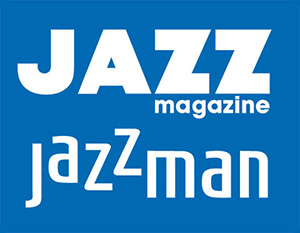Juliet's Lovers Press Release |
 November 2005 ****Extraterritorial November 2005 ****Extraterritorial |
Plainly entitled #4, this new album of the Amants de Juliette includes an audio CD and a DTS 5.1 CD, a frustrating bonus for those with medieval CD players. However, as far as its contents is concerned, there is no need to be frustrated. The trio digs into and pursues its exploration of inextricable musical branches nesting in jazz and open to extra-European, notably Indian music. They find in the texture and depth of falsely simple tunes, (The Same Day, Hemisphere, La Paz), expertly finding the right weight and balance that brings the arrangements a delicious weightlessness. The suspended phrasing of Serge Adam is woven into that of the piano in an audacious syntactical manner while the tablas follow through with impressive polyrhythms. More ethnic, but also aerial than Brian Eno's « Fourth World Possible Music » with Jon Hessel, Les Amants de Juliette #4 is also a great jazz album. The trio here deploys an aggravating sensitivity toward sound and matter as well as a 6th sense of composition. Anne Ramade |
A rare trio, these lovers are. Struck by Juliet since 1994 (their first recording), and who don’t tire in regularly addressing us news of their latest conquests, like this new opus taking once again the name of the trio formed by the trumpetist Serge Adam, the pianist Benoît Delbecq and the percussionist Philippe Foch. In nine thought out and playful pieces, the three musicians prolong the universe of Don Cherry encountering world music and a melodic itinerary. Adam on the trumpet, Delbecq on the prepared piano and Foch on tablas and other percussion instruments share the same sense of space, where interplay takes the lead. Raw improvisation without fillers, where the rhythmic canvas gives an impression of impressionistic ballads. Thierry Lepin |
JAZZOSPHERE |
 April 2002 |
The story doesn’t say how many lovers Juliet has. However, this third CD by the trio shows how much these three « Romeos » (pianist Benoit Delbecq, the trumpet of Serge Adam and the tablas of Philippe Foch) know how to practice the art of seduction without provocation but with irresistible talent and elegance. Crossing through polyrhythmic India and Africa, the prepared (or not) piano mixes with tablas and the trumpet traces sophisticated and delicate light accents. In short, Juliet is a satisfied woman. We are too. Xavier Matthyssens |
Built on repeating intricate motives, the music of the trio Juliet’s lovers develops on a playful thread, a game where each member brings his own share. The orchestration is atypical: on the piano, Benoît Delbecq weaves a trace of clear notes, sustained by the polyrhythms of the tablas and other percussion instruments of Philippe Foch, while on the trumpet, the measured phrasing of Serge Adam draws arabesques. Delicate work, resting on remarkable placement that one can hear on the last CD of this trio (Quoi de neuf docteur/ Night & Day). But it’s still in concert that the formula flowers in full. Hugues Le Tanneur |
ADEN |
 March 2002 |
Three CDs since 1994, all three titled Les amants de Juliette, to render the combination of jazz with music from elsewhere (India, black Africa…). The subject, acoustical, avoids the breakup of tradition and showmanship. Serge Adam (trumpet), Benoît Delbecq (prepared piano) and Philippe Foch (tablas and percussion) are rather pointillist improvisers, bothered with detail and maintaining a collective momentum by their choice of notes, rhythms and timbres. Clearly on the same wavelength, the three musicians open a vast imaginary space without leaning toward the contemplative aspect one expects under these circumstances. Organic, sensual and of great intelligence. Sylvain Siclier |
CDs are objects. This one, however, is a curiosity. Even so, note this since no one will tell you elsewhere, it all started with a rejection of the object in question. The one I have in my hand is no longer the initial one. One of the members of the trio, after having nightmares about its visual aspect– a photo of a male nipple on a contour woven card …- destroyed all parts of it, outer case, metal disk, because of due rights. The esthetic avant-garde does not exclude ethic reserves or moral labels… The music is left alone, intact under a remodeled plastic-paper case. Juliet’s lovers represents a story of the race of a light horseman infatuated with music freed from its stall. First comes their light stride, then their capability to switch from trot to gallop when needed in order to free up the track, to speed up the step. If needed, the polyrhythmic strikes reintroduce Africanisms, the chords bring orientalism, the layering of the purposefully masked instruments (does a prepared piano remain a piano?) sometimes leads us to a non-identified product. It’s just a question of which color dominates. And the desire. The perfume that lingers remains an exterior factor. The only reality that cannot be exceeded: the trumpet is the song figure. The pleasure in taking it all in comes in the month of the ballad (May). One can feel that the music of the trio aims to let in fresh air. Light and airy (Adam), acrobatic spirit (Delbecq) and harmoniously muscular (Foch). The panorama here, out of focus, with a zoom lens or even out of the picture, requires the listener to have a keen sense of reception. That goes to show that taboos of the eye and the ear aren’t necessarily two of a kind. This could be the real lesson to learn in the love story of Juliet’s lovers. Robert Làtxague |
|